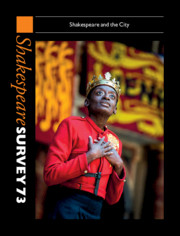Book contents
- Shakespeare Survey 73
- Shakespeare Survey
- Shakespeare Survey 73
- Copyright page
- Editor’s Note
- Contributors
- Contents
- Illustrations
- Continental Shakespeare
- The Stranger at the Door: Belonging in Shakespeare’s Ephesus
- City Origins, Lost Identities and Print Errors in The Comedy of Errors
- The Circulation of Youthful Energy on the Early Modern London Stage: Migration, Intertheatricality and ‘Growing to Common Players’
- In Conversation with Shakespeare in Jacobean London: Social Insanity and its Taming Schools in 1&2 Honest Whore
- Hearing Voices: Signal Versus Urban Noise in Coriolanus and Augustine’s Confessions
- Caesar and Lear in Hong Kong: Appropriating Shakespeare to Express the Inexpressible
- Before We Sleep: Macbeth and the Curtain Lecture
- ‘The Story Shall be Changed’: Antique Fables and Agency in A Midsummer Night’s Dream
- A Lawful Magic: New Worlds of Precedent in Mabo and The Winter’s Tale
- ‘Cabined, Cribbed, Confined’: Advice to Actors and the Priorities of Shakespearian Scholarship
- ‘What Country, Friends, is This?’: Tim Supple’s Twelfth Night Revisited
- Through a Glass Darkly: Sophie Okonedo’s Margaret as Racial Other in The Hollow Crown: The Wars of the Roses
- ‘Who’s There?’ Britain’s Twenty-First-Century Obsession with Celebrity Hamlet (2008–2018)
- Shakespeare Performances in England, 2019
- Productions Outside London
- Professional Shakespeare Productions in the British Isles, January–December 2018
- The Year’s Contributions to Shakespeare Studies
- 1. Critical Studies
- 2. Shakespeare in Performance
- 3. Editions and Textual Studies
- Abstracts of Articles in Shakespeare Survey 73
- Index
- References
1. - Critical Studies
from The Year’s Contributions to Shakespeare Studies
Published online by Cambridge University Press: 04 September 2020
- Shakespeare Survey 73
- Shakespeare Survey
- Shakespeare Survey 73
- Copyright page
- Editor’s Note
- Contributors
- Contents
- Illustrations
- Continental Shakespeare
- The Stranger at the Door: Belonging in Shakespeare’s Ephesus
- City Origins, Lost Identities and Print Errors in The Comedy of Errors
- The Circulation of Youthful Energy on the Early Modern London Stage: Migration, Intertheatricality and ‘Growing to Common Players’
- In Conversation with Shakespeare in Jacobean London: Social Insanity and its Taming Schools in 1&2 Honest Whore
- Hearing Voices: Signal Versus Urban Noise in Coriolanus and Augustine’s Confessions
- Caesar and Lear in Hong Kong: Appropriating Shakespeare to Express the Inexpressible
- Before We Sleep: Macbeth and the Curtain Lecture
- ‘The Story Shall be Changed’: Antique Fables and Agency in A Midsummer Night’s Dream
- A Lawful Magic: New Worlds of Precedent in Mabo and The Winter’s Tale
- ‘Cabined, Cribbed, Confined’: Advice to Actors and the Priorities of Shakespearian Scholarship
- ‘What Country, Friends, is This?’: Tim Supple’s Twelfth Night Revisited
- Through a Glass Darkly: Sophie Okonedo’s Margaret as Racial Other in The Hollow Crown: The Wars of the Roses
- ‘Who’s There?’ Britain’s Twenty-First-Century Obsession with Celebrity Hamlet (2008–2018)
- Shakespeare Performances in England, 2019
- Productions Outside London
- Professional Shakespeare Productions in the British Isles, January–December 2018
- The Year’s Contributions to Shakespeare Studies
- 1. Critical Studies
- 2. Shakespeare in Performance
- 3. Editions and Textual Studies
- Abstracts of Articles in Shakespeare Survey 73
- Index
- References
Summary
After nearly ten years as critical studies reviewer for Shakespeare Survey, I am looking fondly on my over-burdened and groaning table of books for the last time. To kick off my co-mixture of joy and lamentation, I begin with Genevieve Love’s Early Modern Theatre and the Figure of Disability. Here Love approaches the figure of disability, less as an embodiment of physical capacity than as a trope, a rhetorical figure, through which the theatre comes to express its primary function as both prosthesis and representation. The figure of her title is not then the body of the actor or character, the human subject or experience of being dis-abled, but the language through which the theatre experiences itself as a representation of something else.
- Type
- Chapter
- Information
- Shakespeare Survey 73Shakespeare and the City, pp. 252 - 265Publisher: Cambridge University PressPrint publication year: 2020

